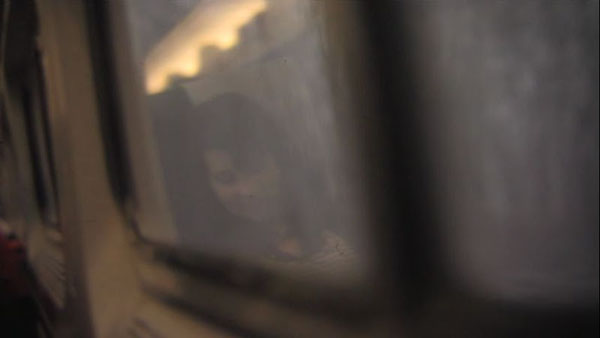Before turning to what critics have been saying about Gina Telaroli‘s Traveling Light (2011), we need to make note of—and cheer on as well!—the unusual rollout here. Starting today, for one full month, Lumière will be presenting the 58-minute film online and for free in conjunction with screenings around the world “to remember and celebrate that cinema is a communal art and that the digital technology that allows us to so easily share cinema on computer screens alone in our apartments also makes it easier for us to organize our own screenings in public spaces.”
Besides screenings in Poland, Russia, Brazil, and Spain, New York’s Anthology Film Archives will present Traveling Light today, tomorrow, and Sunday as part of Closely Watched Trains, a mini-series programmed by Telaroli that also includes Josef von Sternberg‘s Shanghai Express (1932), Richard Fleischer’s The Narrow Margin (1952), and Robert Aldrich’s Emperor of the North (1973). And in Lisbon, Cinemateca Portuguesa will present nine works by Telaroli alongside six by David Phelps over two nights, November 28 and 29. Further cities and dates can be found here.
Now then. Here’s Peter Labuza: “Gina Telaroli’s Traveling Light strikes me as a work essentially about loss, and one that operates unlike any other film set on a train—its visual language and rhythms are highly unique (certainly falling under the category of ‘experimental’ but never didactically so). The film is almost like a collection of postcards, filled with moments of reflection on not only how we view the world, but also how we view each other. It’s also a film that stirs emotions hard to explain. The fact that Telaroli’s initial plan for the film went haywire (described her in my interview with her) and the final work is still something of rapturous transfixion, should speak no doubt to the conviction she has when wielding cinema.”
Traveling Light Scene from Gina Telaroli.
Michael Lieberman took part in the film’s making: “I love this film, possibly because I see so much of myself in it, or because I’ve watched it move from a narrative to a sort-of-non-narrative film, halved in length, properly butchered into something miraculous. It’s a film removed from city life, but only features city dwellers; it functions on non-city time, but there’s a sense of anxiousness in idle time that New Yorkers will pick up on immediately. It’s a film that takes its time, unfolding like an afternoon spent with friends. Its formal rigor, sensitive to sunlight and shadows, is often challenged by long takes that explode with energy and ones that at first seem to exist as time-based records. It’s impossible to distance myself from this film, which I’m fine with, and wish I could be a lucky soul seeing it blindly for the first time.”
José Sarmiento Hinojosa for Desistfilm in February: “Probably one of the best obscure films of 2011, Traveling Light deserves a reappraisal by hardcore cinephiles, film critics and lovers of the contemplative.” In May 2012, Glenn Kenny called it “one of the most striking and exciting films I’ve seen this year… The views of a grimy grey present are alternated with shots that look like they could have come out of a silent picture. See, for example, the image at the top of the page. The near sepia-color, the blackness on either side of the 1.85 frame very much suggesting an iris-in shot. Extraordinary. This is not just beautiful in and of itself but an iteration and acknowledgement of cinematic consciousness.”
Update, 11/16: Gina Telaroli has posted a new entry at her tumblr dedicated to Traveling Light: ” I think it’s a movie that (hopefully) speaks for itself and I’m not always so great at talking about my work specifically, but I had ambitions that I would finally organize many of my recent thoughts and tackle issues of class, privilege, wealth and their connection to cinema and to my own filmmaking, as well as my concerns, both practical and philosophical, about my future involvement (or anybody’s for that matter) with these things we call the movies.”
For news and tips throughout the day every day, follow @KeyframeDaily on Twitter and/or the RSS feed. Get Keyframe Daily in your inbox by signing in at fandor.com/daily.




